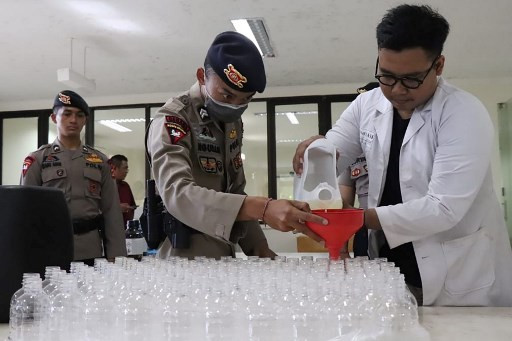Popular Reads
Top Results
Can't find what you're looking for?
View all search resultsPopular Reads
Top Results
Can't find what you're looking for?
View all search resultsPoor management, coordination hampers Indonesian R&D: KPK study
The anticorruption body has identified poor research management and coordination, including untracked funding, as the primarily obstacles in Indonesia's research and development sector.
Change text size
Gift Premium Articles
to Anyone
A
recent study by the Corruption Eradication Commission (KPK) shows that poor management, including lack of coordination and ineffective financial management, has hampered Indonesia’s research and development (R&D) efforts.
The KPK found that Indonesian researchers had not effectively used their research funding, particularly those researchers at universities, community cooperation and empowerment institution (LKPM) and government research institutions at ministries, state agencies and regional administrations.
Many of the products that were produced from research and supporting facilities were nonaccountable, especially university research products, the findings revealed. Furthermore, the antigraft agency had received many reports on fictitious and overlapping research projects, as well as large amounts of unused research funds.
“For the KPK, it was important to study the research sector, as there are many research institutions across ministries, agencies and regional administrations [that have no] coordination. They are widely scattered and unorganized, without any direction on Indonesia’s research focus,” KPK commissioner Nurul Ghufron said at a press conference on Tuesday.
He added that the lack of coordination hampered the process of approving proposed research budgets.
Read also: Indonesia looks to domestic innovations to tackle COVID-19
Nurul said that the absence of a coordinating body meant that the nation's research efforts had no clear direction.
“If the direction is unclear, the [research's] contribution and usefulness to Indonesia will also be bleak,” he said.
Nurul suggested that the government should set up a coded system for research projects and tag research budgets to keep track of funding.
Tracking the funds was essential, as the KPK study found that only 23 out of 87 ministries and agencies listed a research budget on their annual work and budget plans (RKA-KL). Moreover, several of these ministries and agencies did not allocate the research budget to their R&D department, and instead itemized the budget for other purposes, which compounded efforts to track the funding.
The funds that the KPK study could track down amounted to around 0.25 percent of Indonesia’s gross domestic product (GDP). This was a relatively low figure compared to other countries, the majority of which allocated an average 2.63 percent of GDP toward research and development.
The KPK suggested that other regulations be issued on research management, such as those that defined and regulated research funding use, management and ethics, as well as a code of ethics for researchers to regulate compliance with national science and technology standards.
Read also: Jokowi dreams of AI bureaucracy. But why is his administration waging war on science?
In October 2019, President Joko Widodo established the National Research and Innovation Agency (BRIN) to consolidate R&D efforts in the country under the former Research, Technology and Higher Education Ministry.
The ministry then drafted the 2017-2045 National Research Master Plan (RIRN) to streamline the country’s long-term R&D needs. The 2017-2045 RIRN was then followed by the development of the 2020-2024 National Research Priority (PRN).
But the BRIN has been beset with difficulties in consolidating the nation's R&D efforts across the many research institutions, primarily due to limited funds and untracked funding.
“To reach the [RIRN and PRN] targets, we need to consolidate and coordinate all resources, researchers as well as funding and assets like laboratories," Research and Technology Minister Bambang Brodjonegoro, who also heads the BRIN, said at Tuesday's press event. In maximizing these resources, "we can ensure the efficiency and effectiveness of [research projects]”, he said.
However, he concurred that the ministry needed to devise a new method of coordination to manage university research.
Read also: Indonesian researchers set to win share of 2019 Newton Prize
KPK commissioner Nurul added that following the structural changes, the commission would readjust its recommendations and action plans for the research sector, which it originally submitted to the ministry in 2019.
“To integrate [national R&D], we need access and authority over those institutions and their activities in research, development and application,” said Bambang, adding that further regulation was needed to strengthen the BRIN’s role and authority.
The minister approved a Rp 1.37 trillion (US$98 million) budget in January 2020 to fund 16,048 university research projects and 12,248 non-university research projects this year.










